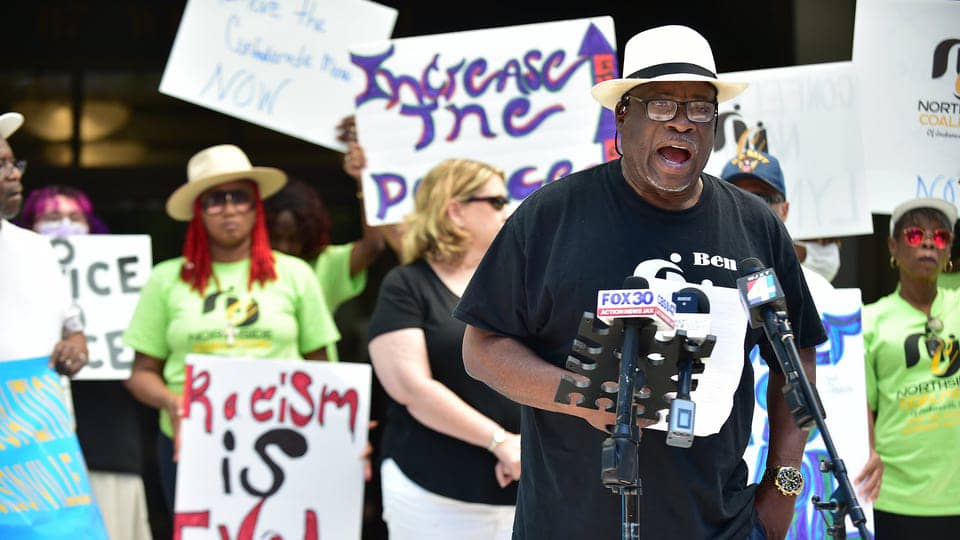There is a growing debate around reparations for slavery as a means to achieve racial equality in the United States.

In a nation grappling with promises of police accountability, a conservative-led backlash against diversity, equity, and inclusion policies, and a recent Supreme Court ruling on affirmative action, the discussion on reparations for slavery has resurfaced as a pivotal solution for achieving racial equality. President Joe Biden and Congress have faced criticism for their inability to address these issues effectively, leading to a widespread debate among Black Americans and the broader population.
Public Opinion On Racism
Ahead of the July Fourth holiday, a recent poll conducted by USA TODAY and Suffolk University revealed that racism is a major concern for 45% of Americans, with an additional 38% considering it a problem, although not the most significant one facing the nation. Surprisingly, only 14% of respondents claimed that racism is not a problem. These statistics reflect the current state of the country, characterized by a deep-rooted divide and an evolving demographic landscape.
Divergent Views And Ethnic Heritage
Notably, the perception of racism varies significantly among different racial and ethnic groups. While some politicians, like Nikki Haley and Tim Scott, emphasize their ethnic backgrounds as examples of progress, opinions on racism are closely tied to individuals’ heritage. According to the same survey, a staggering 79% of Black Americans view racism as a prominent issue, in stark contrast to 39% of whites and 46% of Hispanics who share this sentiment.
The Urgency For Reparations
Reparations for slavery have emerged as a contentious topic, generating divisions along racial lines. Activists, exhausted by the cycle of protests and limited progress, are advocating for reparations as a means of compensating for historical injustices, particularly in areas like housing discrimination. Some cities, such as Evanston, Illinois, have already implemented housing restorative programs and direct cash options for eligible Black residents. Similar initiatives, such as California’s reparations task force and a recently passed bill in New York, signify the growing prominence of this issue.
The National Dialogue On Reparations
The discourse on reparations signifies a renewed effort to address a longstanding injustice and unpaid debt. Economists, like William Darity, argue that the federal government should pay a minimum of $14 trillion to bridge the wealth gap between Black and white Americans. While white support for reparations historically remained low, recent surveys indicate a significant shift, with around 30% of white Americans and 57% of those aged 18 to 29 expressing their endorsement. This changing sentiment provides an opportunity to mobilize a social movement aimed at pressuring Congress to enact comprehensive reparations legislation.
The Call for Action
Advocates are calling on President Biden to establish a federal reparations commission through an executive order. Failing to address this issue could have severe repercussions for the president, given the crucial role Black voters played in his 2020 victory. In California, members of the Reparations Task Force highlight the ongoing legacy of harm caused by slavery, including issues such as eminent domain, redlining, and systemic barriers to employment and education. The task force has proposed a range of recommendations, including cash payments, policy reforms, and free college tuition, culminating in a 1,100-page report submitted to state lawmakers for consideration.
The Cost Of Inaction

Although the cost of reparations is undoubtedly high, it mirrors the profound harm endured by Black Californians throughout history. State Senator Steven Bradford, a member of the task force, emphasizes that the harm suffered by Black Californians is commensurate with the financial investment required for reparations. State Attorney General Rob Bonta also underscores the urgency of remedying the situation, stating that reparations are not only necessary but also warranted and needed.
The issue of reparations for slavery has gained significant traction in the United States, as more lawmakers and activists recognize the need to address historical injustices and bridge the racial wealth gap. Public opinion has shifted, with a growing number of Americans, including white individuals, endorsing reparations as a means of rectifying systemic inequalities. Initiatives in cities like Evanston and statewide efforts in California and New York highlight the tangible steps being taken towards reparations.
The national dialogue surrounding reparations reflects a renewed energy to address the enduring impact of slavery and the ongoing struggle for racial equality. As the country becomes more diverse and racially aware, the importance of reparations in achieving true justice and equality is at the forefront of public consciousness.
By acknowledging and redressing the past, the United States can work towards a more equitable future, where the consequences of slavery and systemic racism are addressed and rectified. The path to racial equality requires collective recognition, proactive measures, and a commitment to healing the wounds of the past.
It is evident that the cost of racism, both in terms of its enduring impact and the financial investment required for reparations, is high. However, the potential benefits of achieving racial justice and healing the deep-rooted wounds of systemic oppression far outweigh the cost. As the nation grapples with these complex issues, it is crucial for lawmakers, activists, and individuals to engage in constructive dialogue and take meaningful action towards reparations.





